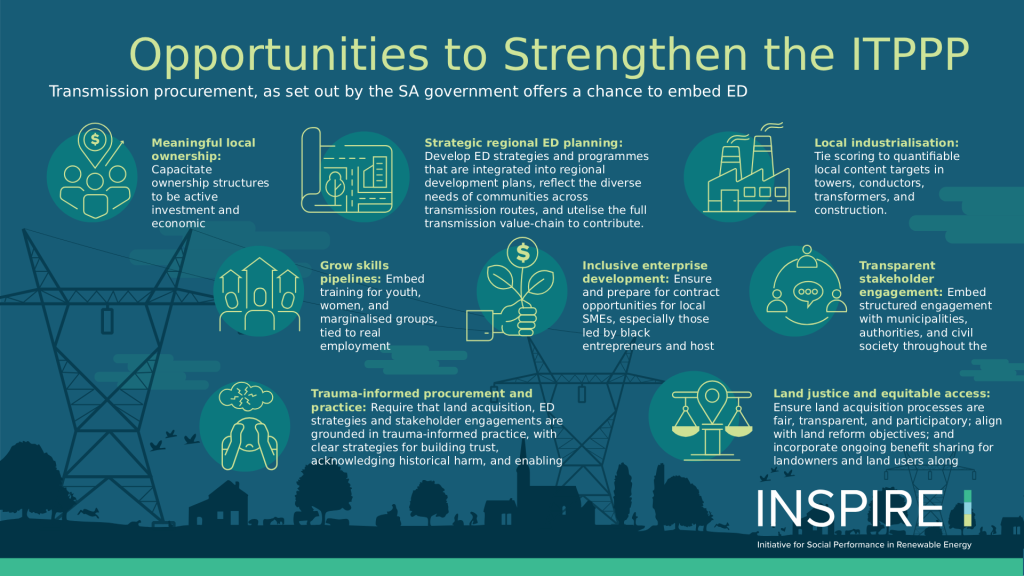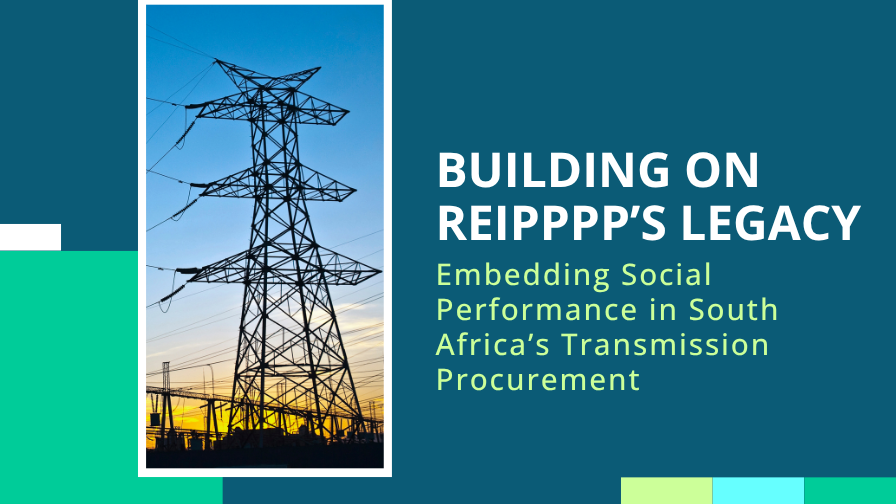South Africa’s Independent Transmission Projects Procurement Programme (ITPPP) is a much anticipated opportunity to modernise and expand our national transmission network. With an ambition to unlock 56 GW of new generation capacity by 2034 and mobilise over R100 billion in investment, the programme is central to our energy transition.
But alongside these technical and financial imperatives lies a strategic imperative: how can transmission procurement deliver measurable social and economic benefits for communities along the network – while addressing the historic and current realities of land access and land justice?
Why Social Performance must be central
Transmission infrastructure is more than steel towers and substations. It shapes land use, intersects with contested and communal land, and influences regional development. In South Africa, where land carries the weight of historical dispossession and ongoing reform, how land is accessed and compensated for is a matter of justice as well as logistics.
Handled well, transmission projects can become vehicles for reconciliation and empowerment, ensuring that landowners, land users, and traditional authorities are respected, that tenure security is strengthened, and that benefits flow equitably to those whose land makes the energy transition possible.
The REIPPPP model has already demonstrated that large-scale energy procurement can integrate binding economic development (ED) commitments – benefiting communities, shaping local economies, and supporting the economic inclusion of historically disadvantaged groups. Building on this, ITPPP can build upon over a decade of grounded REIPPPP implementation experience and go further by making land justice a visible and measurable part of its social performance framework.
Government’s Economic Development Vision for ITPPP
In recent procurement briefings and the released Request for Qualifications/ Pre-qualifications documents for a transmission procurement programme, the Department of Electricity and Energy has confirmed that Economic Development will be a key pillar of the ITPPP.
It is anticipated to mirror elements of the REIPPPP but adapted for transmission. Initial briefings indicate a focus on skills development, enterprise and supplier development, and socio-economic development, alongside ownership and control by South African entities (with 49% SA participation, including up to 5% local community ownership) as well as local manufacturing and industrial development, and job creation targeting historically disadvantaged individuals.
These commitments are expected to be embedded as binding bid requirements and scoring criteria at RFP stage.
Lessons from REIPPPP
REIPPPP’s experience embeds several foundational elements of effective social performance, including extensive ED scorecard, minimum threshold for SA ownership participation, local content requirements and community benefits and ownership.
These elements created measurable and enforceable commitments, but also revealed implementation pitfalls: unclear guidance on community benefit delivery, challenges in measuring meaningful job creation and developmental impact, and lacking incentives for strategic, integrated and coordinated ED planning and implementation.
Why We Must Learn from REIPPPP’s ED Implementation
Adopting REIPPPP’s ED framework is not enough—it’s vital to actively analyse its successes and limitations. INSPIRE and sector practitioners are documenting these lessons for just that purpose. This week, we host an intensive three-day “Booksprint”—a collaborative retreat where social performance practitioners with deep experience in REIPPPP gather to reflect, distil, and co-author the sector’s shared social performance story. The insights captured here will guide how the ITPPP and other energy sector procurement can build stronger, more accountable, and more impactful social performance mechanisms right from the RFP stage.
This includes integrating trauma-informed principles into procurement requirements and social performance practice. Safeguarding against extractive stakeholder engagement, ensuring safe spaces for inclusive participation, and recognising the need for healing that is prevalent across all members of industry, government and communities as integral to development. Designing procurement with the psychological architecture of our society in mind signals that sound social performance is not a box-ticking exercise, but a core capability bidders must evidence and resource.
Opportunities to Strengthen the ITPPP Approach
Transmission procurement, as set out by the SA government offers a chance to embed ED from day one:

- Meaningful local ownership: Capacitate ownership structures to be active investment and economic development partners.
- Strategic regional ED planning: Develop ED strategies and programmes that are integrated into regional development plans, reflect the diverse needs of communities across transmission routes, and utilise the full transmission value-chain to contribute.
- Local industrialisation: Tie scoring to quantifiable local content targets in towers, conductors, transformers, and construction.
- Grow skills pipelines: Embed training for youth, women, and marginalised groups, tied to real employment outcomes on and around site.
- Inclusive enterprise development: Ensure and prepare for contract opportunities for local SMEs, especially those led by black entrepreneurs and host communities.
- Transparent stakeholder engagement: Embed structured engagement with municipalities, authorities, and civil society throughout the project lifecycle.
- Trauma-informed procurement and practice: Require that land acquisition, ED strategies and stakeholder engagements are grounded in trauma-informed practice, with clear strategies for building trust, acknowledging historical harm, and enabling inclusive participation in decision-making.
- Land justice and equitable access: Ensure land acquisition processes are fair, transparent, and participatory; align with land reform objectives; and incorporate ongoing benefit sharing for landowners and land users along transmission corridors.
The Call to Action
The ITPPP isn’t just an infrastructure rollout, it’s a nation-building opportunity. As with REIPPPP, this procurement programme is set to result in much needed upgrades resulting our clean energy percentage. But, as part of nation-building, are we really REIPPPP’ing the full potential of what this can mean for nation building? We haven’t fully succeeded in that with REIPPPP, we scratched the surface on the scale of possible contribution. And we learnt critical lessons. How do we make sure we achieve more with ITPPP?
Combining REIPPPP’s ED framework with the practical lessons available, from procurement design, community trust capacity issues to strategic and integrated ED planning, we can ensure that transmission builds not only a stronger grid but also a stronger connected society and communities.




